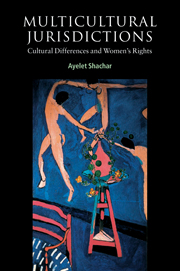Book contents
- Frontmatter
- Contents
- Preface
- 1 Introduction
- 2 The perils of multicultural accommodation
- 3 Family law and the construction of collective identity
- 4 State vs. nomos: lessons from contemporary law and normative theory
- 5 Sharing the pieces of jurisdictional authority: mapping the possibilities
- 6 Transformative accommodation: utilizing external protections to reduce internal restrictions
- 7 Conclusion
- Appendix: How transformative accommodation works in different social arenas
- References
- Index
Preface
Published online by Cambridge University Press: 22 September 2009
- Frontmatter
- Contents
- Preface
- 1 Introduction
- 2 The perils of multicultural accommodation
- 3 Family law and the construction of collective identity
- 4 State vs. nomos: lessons from contemporary law and normative theory
- 5 Sharing the pieces of jurisdictional authority: mapping the possibilities
- 6 Transformative accommodation: utilizing external protections to reduce internal restrictions
- 7 Conclusion
- Appendix: How transformative accommodation works in different social arenas
- References
- Index
Summary
Over the past few years while this book was taking shape, I have been living, studying, teaching, and moving between two countries: the United States and Canada. However, the true origins of this book date back to my childhood in Israel, particularly in the city of Jerusalem. For anyone skeptical about the value of cultural and religious diversity, or the need for the protection of individual rights, a quick visit to this multi-faith, multi-ethnic, and multi-national city soon dispels all grounds for such doubt. Schoolgirls wearing the hijab, the Muezzin's calls for prayer in the mosque, the bells of the Church of the Holy Sepulchre, the personal law tribunals of various Christian sects, the ancient ruins of the City of David, and debates over women's prayers at the Western Wall – these disparate sounds and images combine to form the richly complex cultural mosaic known as Jerusalem. Gender tensions and collective identity markers are part of everyday life here, but they are prevalent in many other parts of the world as well.
The first half of this study explores these complex relationships and critically assesses the potentially negative internal effects of well-meaning policies of multicultural accommodation. It is my belief that we cannot comprehend the ways to resolve these tensions (let alone begin to imagine them), if we do not step back and re-evaluate the inevitable interaction that has taken place between minority groups and the state ever since the inception of modern citizenship.
- Type
- Chapter
- Information
- Multicultural JurisdictionsCultural Differences and Women's Rights, pp. xi - xivPublisher: Cambridge University PressPrint publication year: 2001

